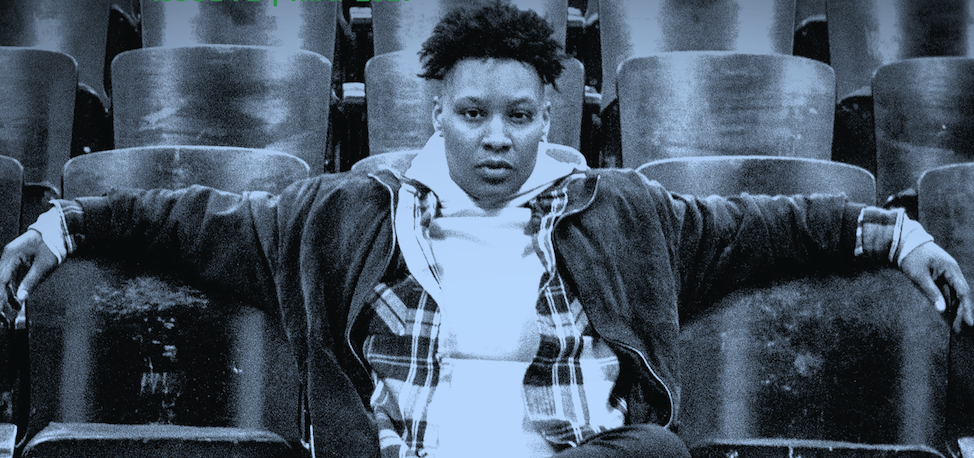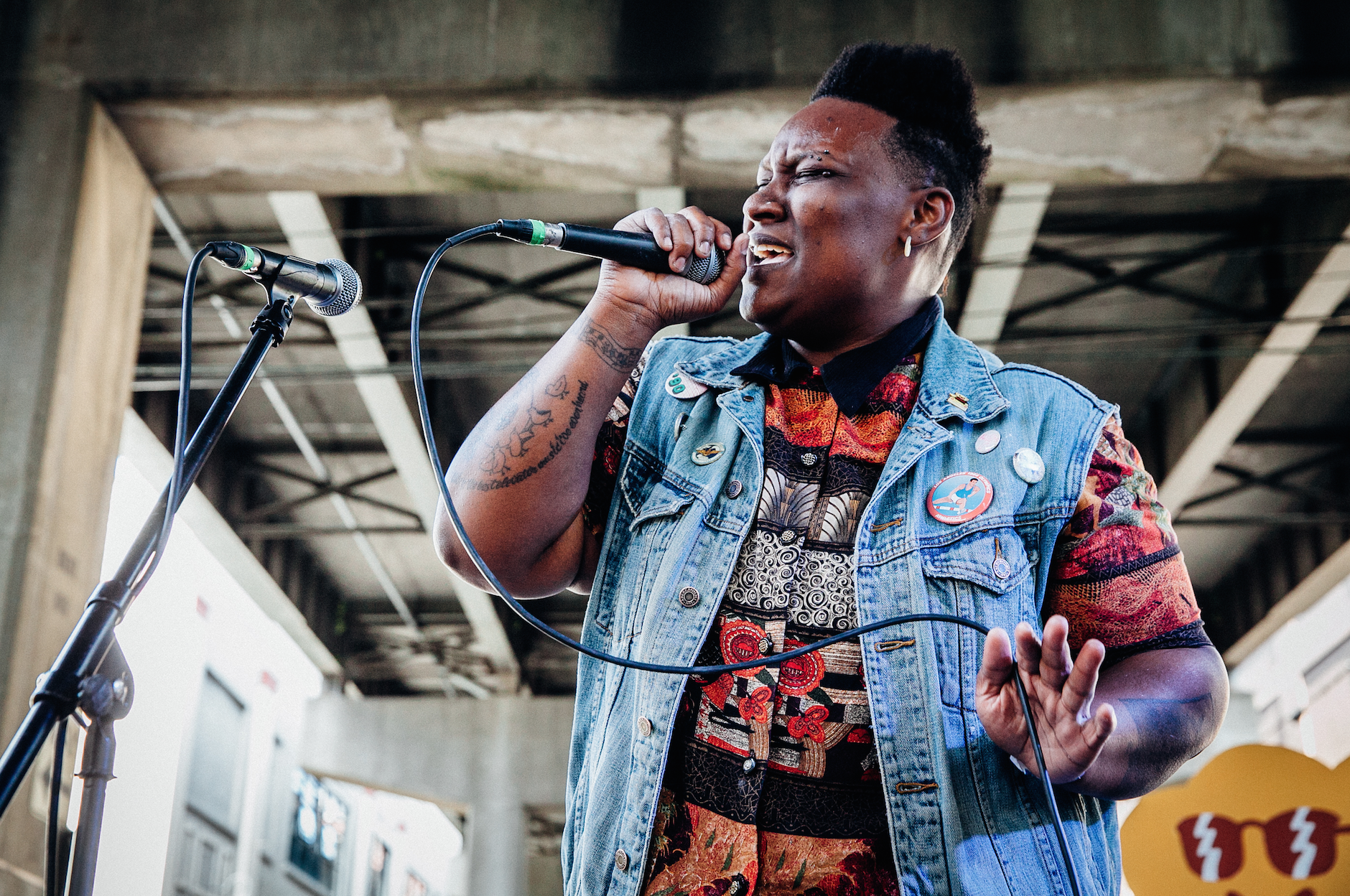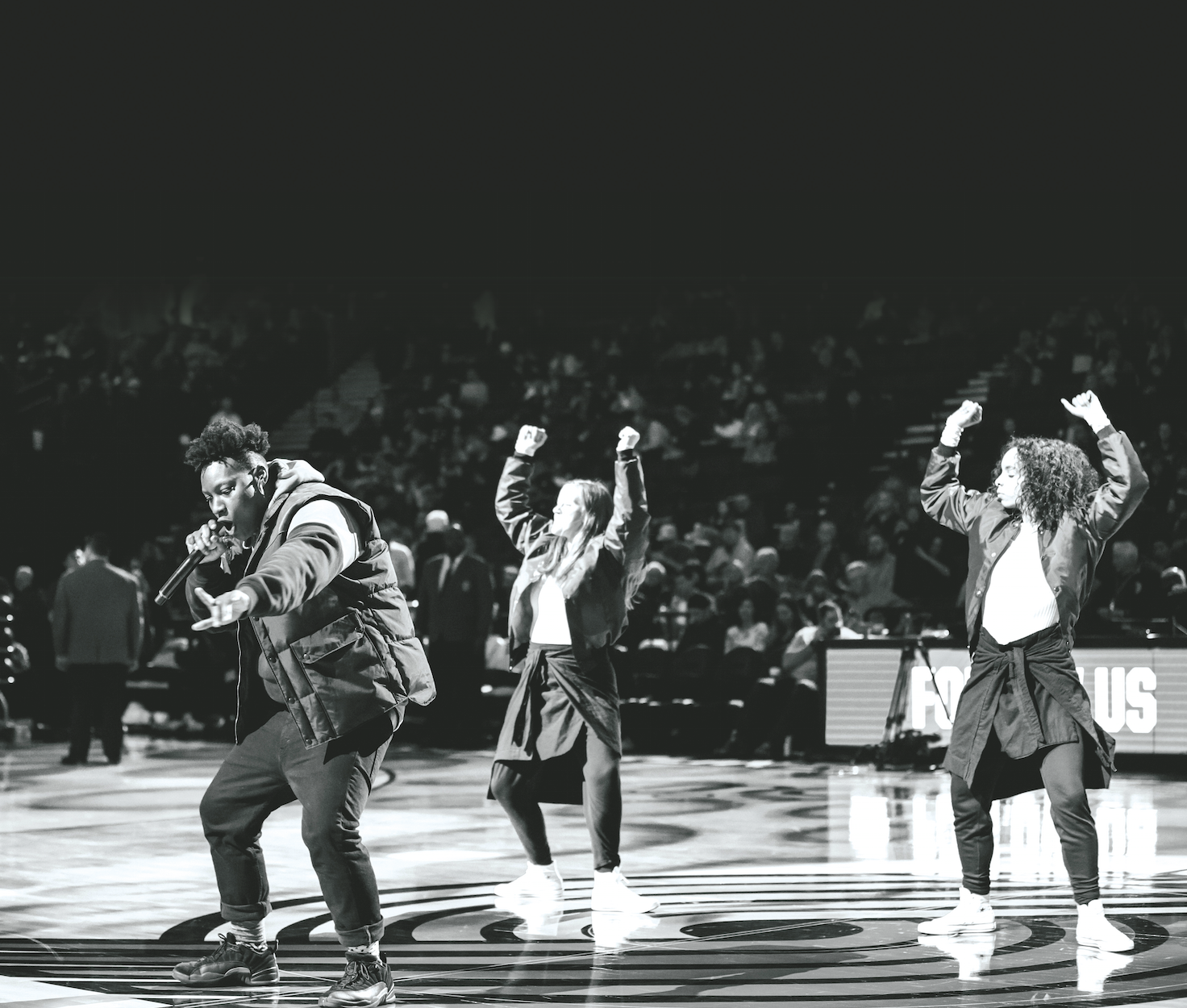The Last Artful, Dodgr


Hers is a relaxed swagger, a self-conscious confidence that has a way of putting the room at ease, while also drawing the focus to herself. It’s the classic self-assuredness of the rapper’s presence, but with a sense of measured perspective as well, a wry acknowledgement of just how absurd the whole thing is. Her attitude is just as evident in her music, emanating from the very marrow of her February collaboration with producer Neill von Tally, Bone Music, put out by Portland’s up-and-coming Eyrst label.
The album paints an industrial world in the faded blues of a working-class collar, its goal in large part being to dissect the ways in which the forces of labor and love feed off one another. Though not quite comedic, it remains tongue-in-cheek, well aware of its project and that the best way to approach the most serious of things is with a smile and a little sidestep, coming in just left of where you thought you were looking.
After the photoshoot, we pick a row in the empty theater to sit down and talk. Talk we do, until the people from the theater let us know it’s time to go. We head back into the bar next door and keep talking while Dodgr steals a bit of charge for her phone. We get around to books we’re reading — she’s just started The Time Machine, though she’s not sure she’s a big fan of H.G. Wells’ prose — and soon I’m offering my thesis that most of the relevant poets these days are rappers. She nods sagely, stroking her chin. “That’s what I’m going for with my stuff,” she says. “I want it to be like Rumi. I want for you to hear two lines and it’s like, whoa.” She pantomimes an explosion out from her forehead, gesturing at an expansion which fills the dim bar room and hums from there into the waiting space beyond.

Eleven: So Dodgr, is that what you prefer to be called?
Dodgr: Yes, please, call me Dodgr. Unless you grew up with me.
11: Cool. So let’s start at the beginning. You’ve said in interviews that you’re pretty much completely self-taught? That you learned to use your voice by imitating musicians you heard?
D: Absolutely. The way I’ve perfected my voice is by me impersonating everybody, period. Whether it was a singer or Bart Simpson, you know. That’s just how I learned how to use my different vocal ranges. And then reading, and you know, listening to a lot of popular music. I taught myself how to do everything, really, because I’m a student at the end of the day, and at the beginning of the day. I’m studying everything.
11: I also obviously want to talk about Bone Music, your album that you released in February.
D: Shout out to Neill von Tally, because that’s a fifty-fifty effort.
11: No doubt. And I’ve got some questions about him too, we’ll get there. But so the name “Bone Music” is a reference to how people would smuggle Western music into communist Russia, etched onto x-rays. But what interests me is that most of those songs aren’t overly political, at least lyrically; they’re just love songs. And I feel like your Bone Music is similar in that the songs are mostly about love and relationships too, and it’s through that lens and this sort of sonic atmosphere you create that you reach these complex social ideas. I was wondering if you could speak a bit about that decision and how you chose to work with that form.
D: Well, the one thing that’s gonna make people relate at the end of the day has to be humanity, right? And what’s the one thing that links every human being, but love? And of course if we were going to make an album about a blue collar worker and their lifestyle, what is the most important part of their everyday life, but love? So we had to tackle that, the issues that they’re having with their partner, and the issues that they’re having with themselves in their relationship.
11: Just as an aside, the original Bone Music was a rudimentary form of vinyl — do you have plans to press the album up any time soon?
D: It’s funny you should ask, because I have like five copies of the vinyl sitting on my dining room table. Yeah, they finally got packaged and put together, and we’re putting together a release date very soon.
11: On that note, when you’re listening to music, how do you do it?
D: In headphones, on my cellular device, most of the time.
11: Where do you stand on the whole digital vs. physical debate? How do you see yourself navigating that divide, and how would you ideally release your music?
D: In the future, I’d like to always release vinyl, as long as I … well, I’ll always be able to afford that, because my life is only gonna get better from here, how ‘bout that? [Laughs.] Vinyl is a necessity, but who am I to say that we shouldn’t focus on streaming, because clearly everybody is streaming everything. I don’t want CDs. Tapes are cool for the novelty of it.

11: For sure. Anyways, back to the sonic atmosphere that Bone Music has, obviously Neill von Tally had a lot to do with the direction that went in, although I think a big part of it is how he left a lot of space in the beats for you to work with your vocal range. But how did you guys come to that sound? Did it take you a lot of refining, or was that the way it naturally unfolded?
D: You know, that question is more one for Neill to answer, to be honest, because we both came to our own self-discoveries during the creation of the album. Lyrically and vocally, I totally tested myself, and I would say that sonically he did as well. Are you looking for our inspiration? Like how we came up with that sound? Because unless I fell asleep with Neill and woke up inside his brain, I wouldn’t even know.
11: Fair. I guess to be more specific, what’s your process like? When the two of you get together to write a song, how does that go down?
D: So it can go down a few different ways. For a song like “Count On This,” Neill had the beat playing in the car on the ride home, and he’d played that beat for me before, and it didn’t really connect with me then. But for whatever reason it came on in the car and I’m like, “What is this?” and I immediately came up with that melody (sings the hook) right there in the car on the freeway, stuck in traffic. And as quickly as I was ready to dismiss that track, there I was writing the hook for it, you know? So it can be like that.
Or like “Oofda,” where we’re in the studio and Neill already has a beat ready, or at least a concept ready because that beat wasn’t finished, and I come up with a phrase like “oofda, fuck me like you use ta,” and it’s like, “Holy shit, Neill, how ‘bout you add some extra 808s to this, and make it sound this way?” It really just depends on the situation.
11: Part of how cohesive Bone Music feels is that it’s you and Neill all the way through. Do you see yourself continuing to work with primarily one producer for your projects?
D: Neill is pretty essential to my creative process at this point, so if he’s not going to be my primary producer, making every single song on my project, he’s gonna have his hand in the final mixing of the song that another producer made for me. I just hold his opinion so dearly, so it’s kind of necessary for him to be around.
11: Sure, and I think that’s a pretty common relationship in well-made music, having a producer or engineer who is maybe behind the scenes and has their hand in everything. But I appreciate that you guys put his name on the project as well, because that doesn’t always happen.
D: I mean, I have to. A lot of times rappers act like the producers aren’t the ones who gave them a beat to flex on in the first place. Like, how else would you have a place to showcase your skills if not for this person? So I’m very grateful to Neill. I’m very grateful to Justin Longerbeam too; he’s my engineer, and he’s pretty much the third voice on Bone Music, doing all of the sound design and making it sound as perfect as it did.
11: One of my favorite parts of Bone Music is the back-to-back tracks “Housee” and “Foreclosed.” I was wondering if you could speak a bit about those two songs and how they relate to one another?
D: So in “Housee” you have my character at this house party, possibly committing infidelity, and in “Foreclosed” you have what we are assuming is the voice of my spouse, pretty much saying that they miss me, and that we’re in this co-dependent relationship, and that they don’t know what to do without me there in that situation.
When we got Natasha to sing the new version of “Foreclosed,” I thought it would be cool if she could maybe have been my subconscious possibly speaking, and maybe it wasn’t really my wife’s voice, but it was me thinking that my wife was thinking that. You know? How meta could we be?
11: Part of that pair of songs too, going back to love songs that speak on something larger, is that the titles are an allusion to this process of foreclosure and eviction and gentrification that’s happening all over. Portland is a city that’s expanding in crazy ways right now. You’ve said you’re dedicated to being here and being a voice in this community: How do you see that expansion of the city and your role in it?
D: It really depends on whose perspective you’re viewing it from, because from somebody who isn’t from Portland, I think that expansion can be a necessary evil. This city is not big enough to require 50 new sky-rises downtown or in Northeast, or wherever they’re building condos and stuff, but there are people who need housing, I know that for sure. So where we have new housing and people who need housing, how do we come together and make something happen?
And then as an artist who’s not from here, coming to the city, trying to make a name for myself, I’m not trying to step on any toes, because there are people who grew up here in the city who’ve been wanting to do this for their whole lives too, and now they see someone from outside of the city who’s getting the shine that they feel they deserve. So from my point of view, the whole process is a little shitty regardless, but there’s a silver lining in everything, and with new people and new ways comes a new responsibility for your town, and for the town you live in, for you to make it into what you feel it can be. Just show respect for its potential.
11: On that note, what can we expect coming up from Eyrst? It seems to be doing its best to give some of those slept-on Portlanders that shine.
D: Shoutout to Eyrst. Shoutout to Blossom, who’s dropping a project with Hot Sixteen this summer, which is phenomenal. It’s gonna be super dancey, super vibey. ePP, who used to be a part of TxE, a rap group that was poppin’ a couple years ago, got a lotta shine on XXL and any big hip-hop blog/magazine you can get shine on, he’s got a new sound coming. Ripley Snell has a soul album about to drop that’s gonna blow everyone’s minds, especially since people know Ripley as a rapper, with Wine+Coffee. But this new album is a grammy contender. Seriously. Everybody at Eyrst is doing really big things, but there are people outside of Eyrst, and just around town in general that are doing great things, like Fountaine…Shout out to Amine, he’s not here anymore, but that kid is doing it exactly how all of us dream to be doing it, so shoutout to him. Words.
11: You just recently came out with a dope video for the song “Jazz Crimes,” from Bone Music. How was making that?
D: So we actually shot that video back in November, and I did the Portugal The Man cameo in February, and they had the whole junkyard vibe, and I’m like, “Aww shit, their video is gonna drop next week and my video’s not gonna drop until like May,” but anyway. It goes with the whole story of me possibly harming my best friend because of what went on, and me running from the cops, and who am I but to act an ass with all of my comrades in a junkyard and start a bunch of shit with the local law enforcement? I dunno. I had the idea to steal the scene from Cape Fear, where Robert DeNiro is chillin’ smoking a cigar in the movie theater, watching a movie, fuckin’ with the family, and we found a way to get the Hollywood Theatre to let me post up and watch myself on the screen. I thought that was the coolest.
11: Are there plans for more Bone Music videos?
D: We really wanna do a video for “L.L.C.,” but there needs to be demand for it. So, gimme that demand. [Laughs.] I’d love to do that video, but it’s a budgetary question.
11: Yeah, I mean, that song is from the perspective of an older miner explaining the game to his young protege…
D: Exactly, and we have big ideas for that video for sure. Going into a cave and building our own legit mining set, because it’s hard to find a mine on the West Coast.
11: Man, yes. I’d love to see that happen. You and Amine were on Fallon; you’re playing with him in May, I actually just picked up tickets to that show…
D: Ooh, good move.
11: I was wondering if you could talk about your relationship with him and how you came to work together.
D: You know, I met him for the first time when he did a gig at Wieden + Kennedy last summer. It was before his record deal, before everything really took off, and that was my first introduction to him, and then he called me in November, and was like, “Yo Dodg, I need you to come to New York and sing backup for me,” and I was like, “Really, Adam? Cool, I mean you don’t need to ask me again!”
And since then it’s just been, like, he shows me love; I show him love all the time. My album comes out and he goes on Instagram and plays a song from my album and is like, “fire,” you know? Shares it with his fans. It’s a mutual respect for sure and a very good working relationship. We don’t have, like, crazy rapport, where I’m hitting him up, like, “Oh, we’re best friends,” but it’s definitely love and respect.
11: Dope. Well that’s just about all I have in my notes…
D: Ask me anything, Henry, I’m an open book. You haven’t asked me about Fresh Selects or Kenny Fresh.
11: Ok, OK. What’s up with Kenny Fresh and Fresh Selects?
D: You know how pertinent they are to my career? Kenny Fresh is my co-manager. Technically, I have some stuff coming out with Fresh Selects this year. Like, Bone Music, I love you, but that’s nothing compared what I’ve got coming, ‘cause I’ve only got hits coming. For real, like, we’re not playing around, but Fresh Selects, the Last Artful Dodgr. 2017.
*Listen to Bone Music here. Get tickets to the May 20 show with Aminé here.nd”>here.



